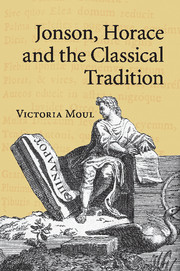Book contents
- Frontmatter
- Contents
- Acknowledgements
- List of abbreviations
- Introduction: imitation, allusion, translation: reading Jonson's Horace
- 1 Jonson's Odes: Horatian lyric presence and the dialogue with Pindar
- 2 Horatian libertas in Jonson's epigrams and epistles
- 3 Competing voices in Jonson's verse satire: Horace and Juvenal
- 4 Poetaster: classical translation and cultural authority
- 5 Translating Horace, translating Jonson
- Conclusion: More remov'd mysteries: Jonson's textual ‘occasions’
- Appendix: manuscript transcriptions
- Bibliography
- Index of passages discussed
- General index
Conclusion: More remov'd mysteries: Jonson's textual ‘occasions’
Published online by Cambridge University Press: 05 October 2010
- Frontmatter
- Contents
- Acknowledgements
- List of abbreviations
- Introduction: imitation, allusion, translation: reading Jonson's Horace
- 1 Jonson's Odes: Horatian lyric presence and the dialogue with Pindar
- 2 Horatian libertas in Jonson's epigrams and epistles
- 3 Competing voices in Jonson's verse satire: Horace and Juvenal
- 4 Poetaster: classical translation and cultural authority
- 5 Translating Horace, translating Jonson
- Conclusion: More remov'd mysteries: Jonson's textual ‘occasions’
- Appendix: manuscript transcriptions
- Bibliography
- Index of passages discussed
- General index
Summary
In the introduction to his selection of Jonson's poems, Thom Gunn remarks of UW 12 (‘An Epitaph on Master Vincent Corbet’): ‘Whatever its source (and ‘sources’ are sometimes a bit like ‘occasions’) it emerges as a kind of discovery, the product of an exploration performed with a quietness and pertinacity suitable to its subject matter.’ If this book has been concerned with the range of textual interactions and strategies that can be encompassed by Gunn's term ‘sources’, it has also dealt with the wide variety of ‘occasions’ to which odes, epigrams, epistles, dedicatory poems, plays, masques and translations respond. All of these genres are concerned with an encounter or an address, but in each case that is accompanied by the further ‘occasion’ of an encounter between the contemporary world and the ancient: above all, an encounter with Horace. What Gunn terms a ‘source’ itself creates an ‘occasion’.
Jonson himself wrote of the role of ‘occasions’ in his art in the well-known preface to Hymenaei (1606):
This it is hath made the most royall Princes, and greatest persons (who are commonly the personaters of these actions) not onely studious of riches, and magnificence in the outward celebration, or shew; (which rightly becomes them) but curious after the most high, and heartie inventions, to furnish the inward parts: (and those grounded upon antiquitie, and solide learnings) which, though their voyce be taught to sound to present occasions, their sense, or doth, or should alwayes lay hold on more remov'd mysteries.
- Type
- Chapter
- Information
- Jonson, Horace and the Classical Tradition , pp. 211 - 216Publisher: Cambridge University PressPrint publication year: 2010



